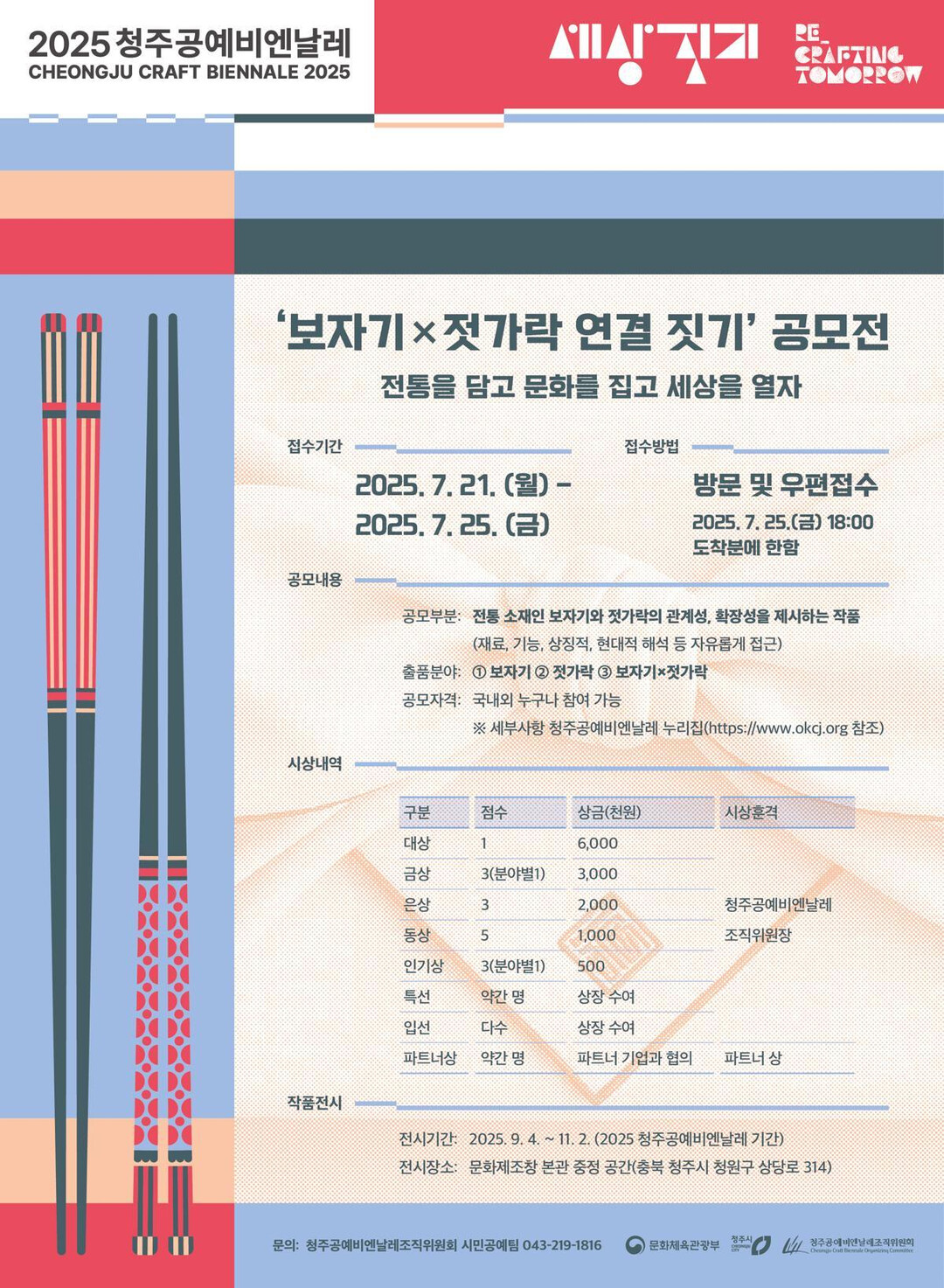
CHEONGJU, South Korea – The Cheongju Craft Biennale Organizing Committee, led by Chairman and Mayor of Cheongju, Lee Beom-seok, officially announced on June 29 the commencement of the 'Bojagi X Chopsticks Connection' competition. Operating under the evocative theme, 'Embracing Tradition, Picking Up Culture, Opening the World,' this initiative seeks to recontextualize two quintessential elements of daily Korean life—bojagi and chopsticks—through the lens of contemporary craft.
The competition is strategically designed to intertwine the esteemed Cheongju Craft Biennale with the broader 'East Asia Cultural City Cheongju' project. Its core aim is to inspire modern reinterpretations of these traditional items, fostering a dialogue between heritage and innovation. Participants are invited to submit works across three distinct categories: Bojagi, Chopsticks, and a fusion category that combines both Bojagi and Chopsticks. Entries should explore the intrinsic relationship and expansive possibilities of these materials, freely incorporating functional, symbolic, formative, and modern interpretations. Submissions must adhere to size specifications, not exceeding 30cm in width, 37cm in length, and 33cm in height. The competition is open to all, both domestic and international artists, with individuals and teams permitted to submit multiple entries.
Bojagi, or Korean traditional wrapping cloths, hold profound cultural significance. Historically known as 'pojagi,' the term is derived from 'bok' (luck) and 'bo' (happiness or fortune), thus translating to "the wrapping of luck." For centuries, bojagi have been an integral part of Korean daily life, used for diverse purposes ranging from packaging, storing, and transporting everyday goods to adorning sacred objects. Crafted from various materials like silk, ramie, hemp, and cotton, they were embraced by all social strata, from royalty (gung-bo, often exquisitely embroidered with intricate designs like subo) to commoners (jogakbo, made from patched fabric remnants, symbolizing thrift and ingenuity). These cloths are not merely functional but serve as a medium for storytelling, with patterns and colors conveying wishes for happiness, prosperity, and longevity.
Similarly, chopsticks are deeply embedded in East Asian culinary traditions, with Korea distinguishing itself through the predominant use of metal chopsticks. Unlike the wooden or bamboo variants common in China and Japan, Korean metal chopsticks are typically flatter, square in shape, and often crafted from stainless steel in contemporary times, though historically, silver, gold, and bronze were used to denote social status and even detect poisons. This unique choice is attributed to several factors, including hygiene, durability, and heat conductivity, which is advantageous for consuming hot Korean soups and stews. The combination of Korean metal chopsticks and a spoon is known as 'sujeo,' highlighting Korea's unique dining custom of using both utensils, where a spoon is frequently used for rice.
This competition is a key component of the 'East Asia Cultural City Cheongju' project, an international exchange program initiated in 2015 when Cheongju was designated an East Asia Cultural City. This designation fosters cultural ties with sister cities like Niigata, Japan, and Qingdao, China. Furthermore, the project aligns with the '2025-2026 Korea-Japan-China 3-nation Cultural Exchange Year,' an initiative launched to promote mutual understanding and friendship among the peoples of the three countries through diverse cultural activities across various fields, including arts, music, and tourism. Cheongju's competition, with its focus on bojagi and chopsticks, will contribute to this broader trilateral exchange through planned exhibitions, forums, and workshops.
The submission period for entries is scheduled from July 21st to 25th of next month, until 6 PM. Submissions can be made either by direct visit to the organizing committee office or via mail. Required application forms are available for download from the official Cheongju Craft Biennale website (www.okcj.org). A rigorous judging process will culminate in the awarding of a total of 27.5 million won in prize money, with the Grand Prize winner receiving 6 million won. All selected winning entries will be prominently displayed at the main central bookshelf of the Culture Factory during the Biennale period, enhancing the cultural landscape of the 'East Asia Cultural City Cheongju' celebrations.
The '2025 Cheongju Craft Biennale' itself, themed 'Re_Crafting Tomorrow,' is set to captivate audiences from September 4th to November 2nd. The primary venue for this world-renowned event will be the Cheongju Culture Factory and various locations throughout Cheongju City. The Cheongju Culture Factory, a significant cultural complex, was revitalized from a former tobacco manufacturing plant that operated from 1946 to 2004. This urban regeneration project transformed the industrial relic into a vibrant hub for arts and culture, housing the Korean Craft Museum, a library, and various cultural facilities, making it an ideal setting for one of the world's largest and most prestigious craft biennales. This competition serves as a testament to Cheongju's commitment to preserving and reinterpreting its rich cultural heritage while fostering international artistic exchange.
[Copyright (c) Global Economic Times. All Rights Reserved.]




























